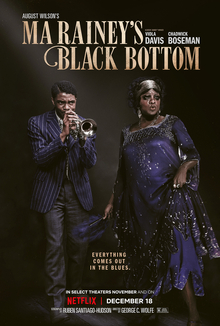Somehow, the invisibility was supposed to shed for Ma Rainey’s Black Bottom. Here she was, a Gay Black fat blues singer from the early 20th century and clobbered down doors for the Blues artists that came after her. Yet, her story is muddled behind a fictional man that never made a historical appearance in her lifetime. This film lacks in displaying the authenticity of this woman who built her career on realness. Written, directed, and executively produced by straight Black men shows how far a story can really be told in the eyes of the observer, not the inquired. It appears her story was rewritten for whoever they needed to get the views and streams, a sad truth Black women often find themselves in.
In the opening scene, we see Ma Rainey in a strange glory. Played by the honored and famed Viola Davis, we see her in anew stature. Swinging around in an obvious fat suit, it’s hard to see the truth of Ma Rainey’s provocation. This starts off the first issue of the film, why didn’t they just use a fat person? I don’t want to overstep my bounds as someone who appears more conventionally slim, but a part of Ma Rainey’s power was having this figure. This is an important part of her legacy. In most westernized cultures, thin is the standard, and fatness doesn’t receive the same associations with sexiness and power, and strength. However, Rainey spits on that fallacy with her wide figure and sensual prowess. For the production team to just hire a thin person and put them in a fat suit is a literal slap in the face to Rainey’s legacy. Instead, Davis attempts to move genuinely but never finds the natural feeling and moves of a large woman.
As a queer woman myself, learning of Ma Rainey’s queerness made me feel at home in the world of representation, but it would have barely been known if left to this film. Her gayness, while not her main highlight, is a layer that deserved greater attention and separation. All you hear is a few mentions of “Ma’s girl” and a little necking action, but nothing further. Rainey’s supposed girlfriend is even seen sleeping with Levee while everyone is waiting upstairs. She doesn’t even get an independent love interest in her own damn movie. It’s treated like an afterthought rather than her being. I don’t think y’all understand how bold that was, being an openly gay Black woman in the ’20s, like excuse me? This deserved greater screen time, greater depth, and more than half-hearted innuendo.
And probably the greatest let down of all was the general lack of storyline of Ma Rainey. the plot found greater interest in the late Chadwick Boseman’s character, Levee who gets a full spectrum of growth and character development, detrimental or not. We learn about Levee’s childhood and the horrors he’s seen as a Black man. We see him try to push his career and watch it get stolen right from underneath him. We see him make an irrational decision amid passion. We see his life when the movie just isn’t about him. Where is Ma’s story? Where is her childhood, where is her depth? Where is her soul besides the few quips and trope-like knowledge she drops on the rare occasion the camera pans back to her? Why is she the secondary character in her own movie? Circling back to Black men being the overseer of this movie only makes this more laughable because it’s so predictable. In the face of other types of blackness, whether queer, fat, and woman, we are invisible to our own.




